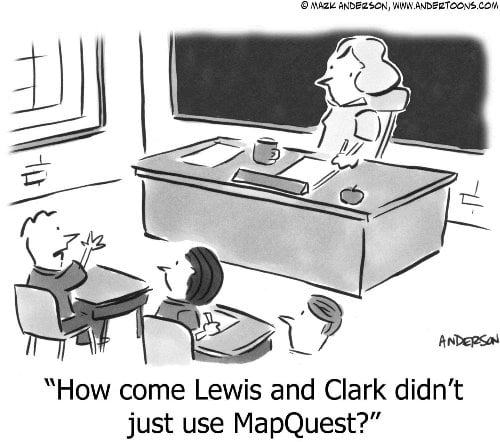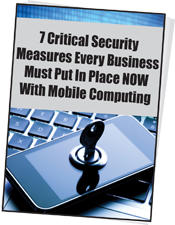
With the “dog days” of summer upon us, excess heat can be a big problem for servers, since a server that becomes overheated usually costs more in energy, fails more often and is more likely to crash.
Here are a few things you can do to prevent equipment from overheating:
With nothing more than some rope, a few guns and a lot of gumption, Jesse James committed the first train robbery in 1873. Although he and his gang were hoping for a windfall of gold bullion, they only made off with a meager $2,000. After that, thousands of train robberies occurred and became common because trains were easy, slow-moving targets full of valuables traveling through unpopulated areas (the most common targets were trains carrying payroll shipments).
Crime has evolved in leaps and bounds since then, but one thing hasn’t changed: there are a growing number of people in the world who have the motivation and the means to rob you blind. The only difference is that instead of getting a gun and holding up a bank or a train full of people, they’re getting smarter and more sophisticated, using software, tools and malware to rob MILLIONS of people, simultaneously, while sitting at home at their PC. They are cropping up in droves in China, Brazil and Russia as the Internet and low-cost online tools and software become available. Worst of all? Businesses are giving these criminals MULTIPLE points of easy entry through unprotected, unmonitored mobile devices.
Every two seconds someone becomes a victim of cyber-fraud in the US. Over 82,000 NEW malware threats are being released every single DAY – and small businesses are cybercriminals’ hottest target because of the low-end or nonexistent security controls they have in place. Combine that with the fact that more companies are allowing employees to access and store confidential data on their mobile devices AND the increasing litigation around data privacy, and you’ve got a perfect litigious storm that EVERY business must address if it is allowing employees to access and store company data on mobile devices.
That’s why it’s critical to have a Mobile Device Management system (MDM) in place. One breach of your company’s information due to a lost laptop or Trojan introduced via a cell phone can cause a nightmare of reputational damage, litigation and lost clients, not to mention the loss of your hard-earned cash.
If you are allowing employees to use mobile devices to access company information or work while out of the office, here are a few tips to keep in mind:
Want to ensure your employees are using their mobile devices securely and efficiently? Our FREE Mobile Readiness Assessment will give you a customized plan for secure mobile device practices and show you how mobile computing can cut IT costs and boost productivity. Sign up today at http://www.dpsolutions.com/mobile.

Dr. Nido Qubein
Executives can multiply their influence by learning the techniques of forceful writing. High-powered writers learn to focus words the way a laser beam focuses light.
Focus your objective. What is the purpose of the material you want to write? Writing can help you achieve the five I’s: it can inform, inquire, influence, instruct and incite.
Focus your audience. Written materials such as reports and brochures can be valuable positioning tools. They should be written with a specific audience in mind — the audience you wish to influence to buy your products or services.
Focus your content. Make sure your message is the right message for the right audience. Don't let unnecessary ideas intrude on your principal message. To quote Professor William Strunk, Jr., the renowned authority on English usage:
“A sentence should contain no unnecessary words, a paragraph no unnecessary sentences, for the same reason that a drawing should have no unnecessary lines and a machine no unnecessary parts.”
Focus your organization. A good piece of writing flows like a symphony. Organize your material so that each topic flows easily and naturally into the next.
Focus your clarity. Some writers think they can hide fuzzy thinking by burying it under a mass of words. To have impact, ideas must be expressed precisely and concisely. Lincoln’s Gettysburg Address required only 275 words, and 196 of them were of one syllable.
Focus your refinement. Perfection rarely emerges from a first draft. Ambrose Bierce once said that “a saint is a dead sinner revised and edited.” Great writing is rough copy revised and edited.
Be your own toughest editor, but don’t stop there. Let others read what you have written before you submit it to your audience. You know what you meant, but you can’t know how others might interpret it until others have read it.
Focus your results. Unless results are built in, they don’t happen. Good writing always does four things:
It creates a feeling.
It gives an idea.
It gives the reader a benefit.
It produces a desired response.
Communication is not a nice-to-have skill. It is essential to success in the business world. To produce and market the products and services to support the billions of people who now inhabit the earth requires a level of communications undreamed of in previous centuries. When the quality of your product depends upon the collective efforts of dozens, hundreds or thousands of individuals, communication becomes the lifeblood of your enterprise.
In fact, communication is at the heart of everything we do. It is the foundation for interaction among human beings. Communication has to do with meanings, with understandings, with feelings, with desires, with needs and with ideas. Our world is filled with information.
But the greatest need is for understanding — for building bridges between human beings so we can better live together, work together, get along with each other and make this earth the best possible home for the human race.
|
|

If you have given, or plan to give, your employees the ability to access company data and systems with mobile devices – DON’T … until you’ve read this free report, which outlines:
 |
Important! We hate spam as much (or more!) than you and promise to NEVER rent, share, or abuse your e-mail address and contact information in any way. |

Headquartered in Bethesda, MD, AMIA (The American Medical Informatics Association) is the leading professional association for informatics professionals. AMIA is the center of action for 4,000 informatics professionals from more than 65 countries. As the voice of the nation’s top biomedical and health informatics professionals, AMIA and its members play a leading role in assessing the effect of health innovations on health policy, and advancing the field of informatics. AMIA actively supports five domains in informatics: translational bioinformatics, clinical research informatics, clinical informatics, consumer health informatics, and public health informatics.
Since 2009, DP Solutions has provided AMIA with Confidence Plus managed IT services. The fully managed tech support model allows AMIA’s leadership to maintain a laser focus on servicing their members, and not be bogged down with the day-to-day IT tasks that keep the business running. Most recently, AMIA has undertaken a mission to enable greater mobility, improve operational efficiencies, and eliminate dependencies on hardware by moving to a cloud-based model with Office 365 and Azure Server hosting.
To learn more about AMIA, visit www.amia.org